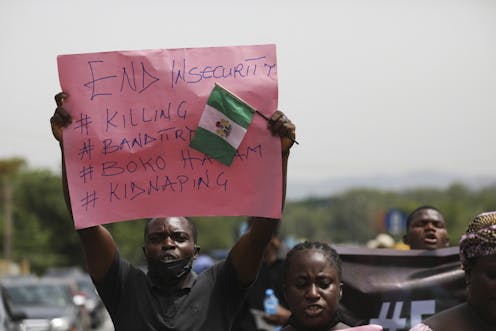
Kidnapping for ransom has become a national security threat in Nigeria. How it’s done varies from targeted individuals, to indiscriminate kidnappings and mass kidnapping in schools and communities.
And there has been a growing body of research on the subject. However, there remains a gap in the understanding of how families mobilise resources and deliver ransom to kidnappers.
To fill this gap, my co-researcher and I combined our expertise, mine on the science of criminality and the victims of crime in Nigeria and his on peace and conflict.
Our study interrogated the roles that families play in finding support and in raising ransom money and ensuring it is delivered to kidnappers to get their loved ones released from captivity.
This information is important to appreciate the experiences, challenges, and coping strategies of those with family members who have been kidnapped. It can help to design post traumatic therapy for victims who have been rescued, as well as those who are close to them, and who may have been traumatised by the kidnap incidence.
We concluded from our findings that the Nigerian government’s decision to criminalise ransom payment by families missed the point because it fails to address the protection of potential victims. It should be revisited.
The study
Our study focused on the Adamawa State in northeast Nigeria, where at least 300 people were kidnapped in 2019.
We interviewed 12 people, through referrals. The sample size is appropriate for a research of this nature due to the confidence building process required to secure participation from, already traumatised, families and friends of people who have been kidnapped.
The people we interviewed included ransom negotiators, a pastor of the church of one of the victims, two police officers from the Force Intelligence Bureau and a Divisional Police Officer, one State Security Service agent, two wives of kidnapped people and five released kidnapped persons.
Our study showed that ransom negotiators were either nominated by families or by the person kidnapped. Kidnappers used threats and the beating of captives to unsettle families and pressure them to raise ransoms.
Family members raised ransoms through family, church and community donations, and through loans. Wives of kidnapped persons coped with spiritual support from church, experiences of others who faced similar situation, and counselling from significant others. Below we outline some of the nuances of our findings.
Finding support
People’s experience varied according to the relationship they had with the victims. For those at the scene of the kidnapping, the emotions and trauma experienced was heightened.
Ill-health, age, and ability to withstand pressure also increased the burden on family.
Our participants unpacked the support mechanisms they used to strengthen and give hope to the immediate family of the kidnapped person.
The church was a pillar of support for some. Others turned to family members, friends and neighbours. Others took loans to pay for the release of their family members.
Friends and brothers risked their lives to negotiate with kidnappers as well as take the ransom to the den of kidnappers.
What’s usually needed
We found that organising for the release of the kidnapped involved the following:
Support systems: The immediate family of the kidnapped person would need a support system. This included emotional support as well as ensuring that the family had food to eat. The church provided spiritual support.
Ransom negotiation team: Selecting or nominating the ransom negotiator was done by a person in the kidnappers’ den or by the family. In some cases, those kidnapped would be asked to drop names of people who could bring ransom money to the kidnappers.
One kidnapping victim gave the name of his father because the father was already a retiree and could mobilise family members to rally round and raise any amount. One nominated his childhood friend.
Role of religious leaders: Spiritual support was provided by the church (prayer and empathising with victim’s family members). Our sample did not include people of other religious persuasions.
Fund raising: Negotiators reported that they eventually mobilised and paid between 271,232 Naira (US$651.49) and 1,807,104 Naira (US$4,343.29) ransom depending on how well they could bargain and how the family cooperated. They highlighted the need to ensure that a wrong signal was not sent to kidnappers about the financial capacity of the family to prevent future kidnapping. Negotiators faced a variety of pressures. They had to deal with the family of the victims, their own families and the kidnappers who would beat the victims in the middle of negotiations.
What needs to be done
The family and their religious and social groups are vital players in the processes leading to the freedom of the captive through ransom mobilisation and delivery. This shows that the African kinship tie is still very strong especially when a member is going through difficulty.
Victims of kidnapping need supportive, coordinated, and organised families not to only negotiate and mobilise ransom but to also manage and cooperate with the kidnappers to ensure a safe release and return.
There is also the need for a post-traumatic counselling for the freed kidnapped victim, their spouses and children.
We concluded that it’s important to provide policies that support families and victims of kidnapping. And that the government must revisit the ban on payment of ransoms. The real issue is to prevent kidnapping. The Nigerian Government must discharge its responsibility to protect to Nigerians.
Oludayo Tade does not work for, consult, own shares in or receive funding from any company or organisation that would benefit from this article, and has disclosed no relevant affiliations beyond their academic appointment.
This article was originally published on The Conversation. Read the original article.






